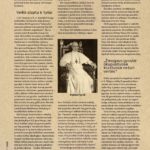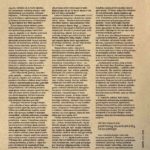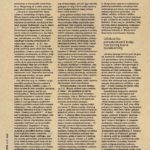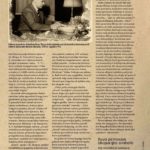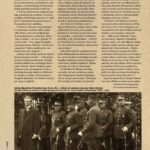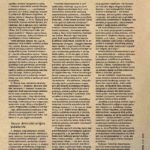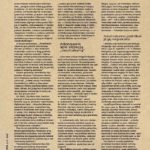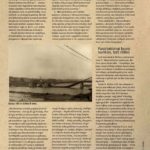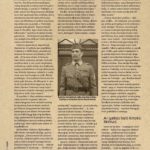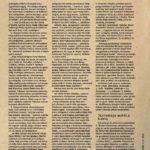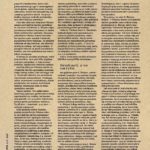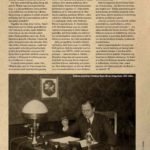Lithuanian military magazine “Karys” [Soldier] published by the Lithuanian National Defense Ministry in its second issue for 2020 has published a long opinion piece by Vidmantas Valiušaitis, a Lithuanian journalist who has made a career of defending Lithuanian Nazi collaborators.
Printed on sepia tone pages apparently intended to show either age or the magazine’s distance from the piece, Valiušaitis engages in a fervent defense of Kazys Škirpa, the military officer in pre-WWII independent Lithuania who took up residence in Berlin and under the direction of Hitler’s Abwehr formed the Lithuanian Activist Front as a clandestine anti-Soviet system of underground resistance cells, and founded the political organ of the LAF, the Lithuanian Provisional Government, with himself as prime minister. The PG was the pro-Nazi puppet regime intended to give the Nazi invasion the cover of legitimacy as a national liberation movement.
The author devotes the first two pages (three columns per page) to defending Pope Pius XII as some sort of background he thinks the reader needs to place Kazys Škirpa in context. He then presents as true historical facts Nazi allegations Jews in Lithuania had fired upon Wehrmacht soldiers, which was used as a pretext to set up ghettos. Valiušaitis then presents a conspiracy theory the Nazis and Soviets conspired against Lithuanian independence, a theory which he says needs further research. He goes on to say attempts to besmirch pro-Nazi Lithuanians were begun by Stalin and are being continued in spirit by Russian president Vladimir Putin, most recently in public statements he made casting doubt on Polish innocence in the Holocaust. He also provides his personal version of Finland’s Winter War, Adenauer’s realpolitik and assorted other matters in fine detail.
Over 14 full three-column magazine pages Valiušaitis attempts to prove his case Lithuanian Nazi leader Kazys Škirpa was not a Nazi, using diaries of contemporaries, cherry-picked correspondence and arguments Lithuania had no choice but to become Nazi Germany’s ally. To press home Lithuania’s total lack of choice, he quotes from Dante’s Inferno about the lowest circle of hell being reserved for those too cowardly to take any position at all. He does make use of non-literary sources, even if they aren’t cited and are sometimes slightly misattributed or anonymous, such as the “American diplomat” who reported on the situation in Kaunas, Lithuania, in 1941 to the US embassy in Moscow, where, Valiušaitis mistakenly claims, Averell Harriman was ambassador (Harriman was FDR’s special envoy to Europe and shuttled between Allied capitals). In other cases Valiušaitis attempts to suppress and cast doubt on historical documents showing the LAF and its political organ the PG were behind public appeals for the mass murder of Jews in Lithuania. Special scorn is reserved for Vilnius mayor Remigijus Šimašius who, Valiušaitis alleges, divided society by championing changing the name of Škirpa alley in central Vilnius.
The magazine “Karys” is financed by the Lithuanian tax payer and presumably also directly or indirectly by NATO. If Valiušaitis continues to issue this sort of verbose Lithuanian Nazi apologética, he might make a serious contribution to Lithuania’s pledge to NATO to spend two percent of Lithuanian GDP on the military. He’s certainly contributing to the idea of a two-tiered NATO, turning the classic question “would you buy a used car from this man?” into “would you trust this country with nuclear weapons?” or, more importantly in Lithuania’s case, “would you send your children to fight and die for this country?”
§§§
The debate over Škirpa’s collaboration with the Nazis ended long ago. According to Lithuania’s International Commission for Assessing the Crimes of the Nazi and Soviet Occupational Regimes in the Commission’s findings published in the spring of 2005, “… the anti-Semitic views of the [Lithuanian] Provisional Government and the Lithuanian Activist Front are well documented. The most complete anti-Semitic expression by the Provisional Government was the draft legislation for [the law] On the Status of Jews.”
As Lithuanian historian Algimantas Kasparavičius wrote in part five of his five-part series for www.lzb.lt called “The ‘Policy’ of the Lithuanian Provisional Government and the Beginning of the Holocaust in Lithuania in 1941”:
Usually balanced and reserved, Škirpa’s political beliefs underwent a radical transformation here. Up till the coup d’etat of December 17, 1926, colonel Škirpa was known in Lithuania for his left-leaning views, his anti-Polish stance and his pro-Russian geopolitical orientation. It was not without Škirpa’s knowledge and blessing that then-prime minister and foreign minister Socialist People’s Party member Mykolas Sleževičius came to a “gentlemen’s agreement” with the Soviets in Moscow in September of 1926 politically aimed against Poland and partially against Latvia as well. Somewhere in 1934 and 1935, however, colonel Škirpa revised radically his political views and geopolitical orientation and now sought to decouple the train car of Lithuanian foreign policy and hitch it to a pro-German locomotive instead. These activities of his reached a certain kind of apogee in January of 1939 when the Lithuanian Foreign Ministry and president Smetona himself considered expelling Škirpa from the diplomatic service for not heeding instructions, not towing the policy line and for carrying out his own completely independent “Škirpish” foreign policy.
The Provisional Government which was politically selected by the LAF and arose out of the uprising with acting prime minister professor Juozas Ambrazevičius at its head did engage in political collaboration with the Third Reich. This is demonstrated by examining the minutes of the sittings of the Provisional Government, full of anti-Jewish, and often anti-Polish and anti-Russian as well (closure of the Vilnius Polish Drama Theater and the Musical Comedy Theater) discriminatory legislation and decrees with typical Nazi rhetoric. That’s beside the fact this quasi-Government established the National Labor Battalion and a concentration camp for Jews, drafted and passed the infamous Regulations on the Status of the Jews, wrote the entirely original preamble to these regulations and never lodged any official protest against the Holocaust in Lithuania.





